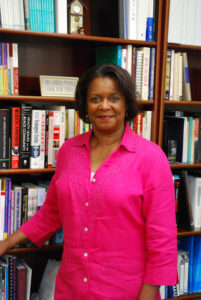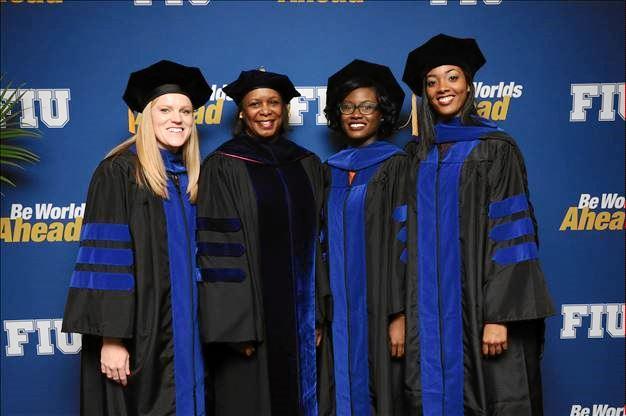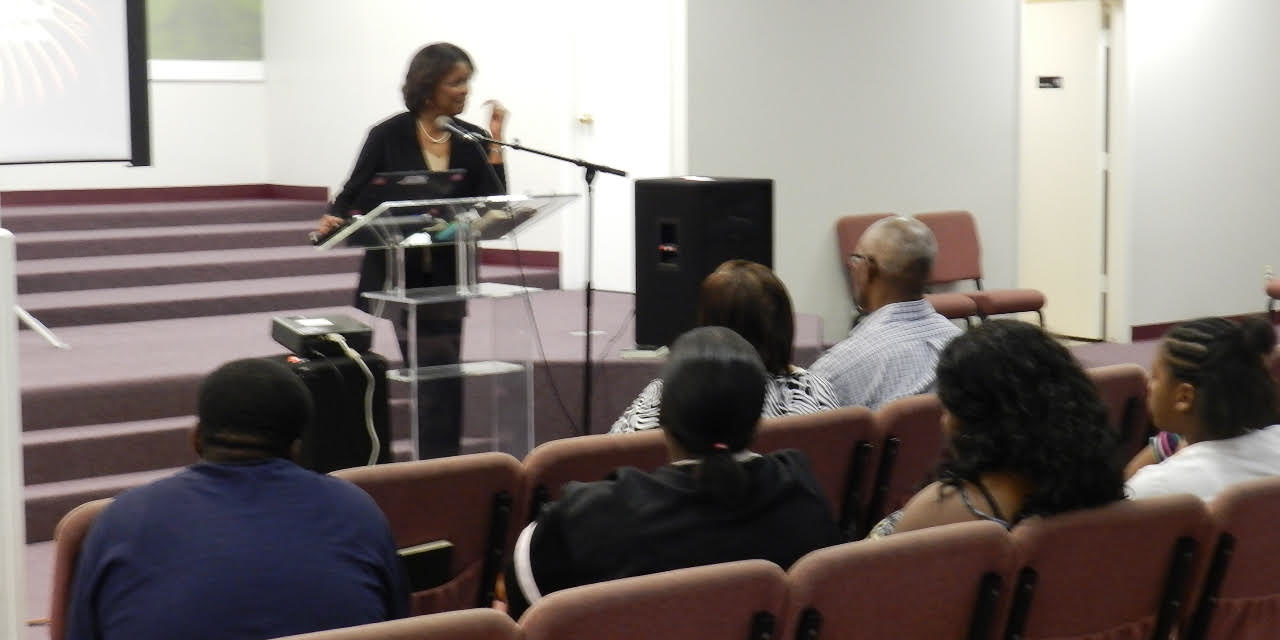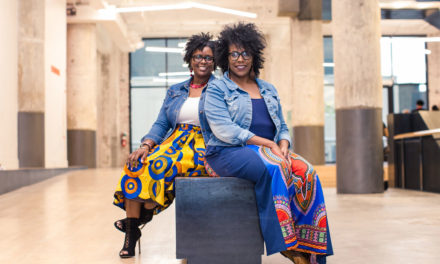
Dr. Mary Shaw
Meet Mary Shaw-Ridley. When you think of the typical college professor, the image that often comes to mind isn’t one who quickly professes a strong love for Christ or compassion for the underserved. But then, Dr. Shaw is not your typical professor. She is personable, approachable and immediately puts you at ease during conversation. She has a PhD and is a Master Certified Health Education Specialist—yet doesn’t dwell on either or allow what she has accomplished professionally to get in the way of who she is spiritually. Some things that stand out when speaking with Dr. Shaw are her obvious intelligence, lack of pretentiousness, contagious smile and easy laugh. Put simply, speaking with her is a pleasure to do. Yet, she is all about business in the classroom and that’s one of the reasons she is so revered by her students and mentees and admired by peers. In fact, she is held in such high regard, she’s had former students willing to move across country just to work with her.
Based on all she has accomplished, you would never guess she came from humble beginnings. Her path hasn’t always been easy, and it was a strong foundation in Christ that has been her anchor and continues to keep her grounded. She is genuinely passionate about helping others to live healthier lives and relished the opportunity to lead our Healthy Living initiative from a spiritual perspective. We’re featuring her in our cover story because it’s important for you to get to know who she is, why she’s qualified to educate you on maintaining optimum health and why she is so motivated to share her knowledge to help you.
HimPower: Dr. Shaw, can you give our readers an overview of your background and how it has helped to shape who you are as a person?
Dr. Shaw: I am the oldest of three siblings, born to Robert and Christine Edwards in Pittsburg, Texas and raised in Fort Worth, Texas. I attended segregated schools in Fort Worth in a neighborhood called Stop Six, in a zip code that currently has one of the highest Black infant mortality rates in the state of Texas and it is higher than the national average. I grew up in a family with strong roots in the Pentecostal and Baptist traditions. I remember going to Baptist Training Union (BTU), Sunday School, and Sunday worship for as long as I can remember, extending back to the primary grades. Both grandmothers went to church every night it seemed to me growing up when I spent summers with them. We, the grandchildren always had to sit near the front of the church so my grandmother could see us. It was sheer torture.
So, I always knew about God, Jesus, and the Holy Spirit. I was engaged in the youth church for as long as I can remember. The village of women in my church were instrumental in who I became. I remember them praying for me when I went off to college and through every phase of my development. However, my intimacy and closer walk with JESUS did not begin until my young adult life after marriage and becoming a mother. Most of those villagers (the women from Sweet Home Missionary Baptist Church) have gone home to be with the Lord–and I can remember the influence that each had on who I am today. The seeds for my Christian journey were planted so long ago, but the surrendering of my will to HIS has been a long process. Oh, the bruises and holding patterns because I was so disobedient. Thank God I had so many spiritually mature women in my life, including my mother. They were praying for me even when I didn’t know that I needed to be praying.
My dad had a 6th grade education, but I never knew that until I was in college. It was never part of our family conversation. He was a mechanic and used the “gifted hands” that God gave him to take care of the family. He was an employee of Bell Helicopter Textron for over 35 years, retiring several months before his death in 1970. Despite his limited formal education, Daddy was my biggest advocate. He always emphasized the importance of a good education. I remember getting a “whipping” not beating because I failed the repeated tests he gave to me to look at his handmade clock and accurately tell time. After the whipping, I passed the “tell time” test! My mother had a high school education and did domestic work for years to provide additional income to our family of 5. She eventually obtained a job as a toll gate cashier at Dallas/Fort Worth International airport. She retired at age 65, and was my friend, confidant, and spiritual counselor for years until her death at age 82. Both of my parents provided the foundation and security I needed to leave home and begin a journey to adulthood. Whenever my wings were broken, they were there to help me heal and fly away again.
Upon graduating high school, I attended Lincoln University (Pennsylvania) for Undergraduate studies, eventually completing my B.S. at the University of Southern California (Los Angeles). Later I completed a Master of Education in Secondary Science education at the University of Maryland (College Park). I spent approximately 16 years in the public schools as a Biology teacher, curriculum coordinator, and finally as a campus administrator. My experiences range from Kindergarten through 12th grade. I spent the first half of my career in public schools and the last 16 years in higher education, specifically in the public health, health promotion, and health education fields. In between the two phases of my career, I attended two years of medical school at the University of Pittsburg before deciding that I really did not want to work on the care and treatment side of illness but thought there had to be another approach to this thing called “health” and in 1991 started a terminal degree in Health Studies/community health at Texas Woman’s University. It was the beginning of a journey focused on prevention within the fields of public health, health promotion, and health education.
One of the most rewarding experiences in my personal and career journey was the two years I spent in Cairo, Egypt where I taught high school biology at a school that served children of American and foreign diplomats. Learning to live in a developing country, particularly a Muslim country was challenging. I really developed an appreciation for the things we take for granted in the U.S. Things like infrastructures that support safe drinking water, food safety regulations, sewer systems that protect us from various communicable water-borne diseases, and the list goes on. Now, that is not to suggest that the U.S. is perfect–especially when we look at the water crisis in Flint and many regions of the country where poor, Blacks and other vulnerable populations continue to be impacted by unsafe and deplorable living conditions. I recognize that many of our rural areas in the U.S. have similar conditions to those I experienced while living in a developing country.
Learning to live in a culture so different from where I grew up in the Dallas/Fort Worth area shaped my attitudes, beliefs, and behaviors regarding perceptions we have about others that we encounter in places where we live, work, and play.
I am a disciple of Christ, wife, mother, educator, researcher, writer, mentor, friend and I LOVE JESUS!
I have been single, married, widowed, and divorced–so there are few women that I cannot connect with on some level. I am married to Charles Ridley, PhD and licensed Psychologist. I have a daughter and son-in-law; son and daughter-in-law. Now I am just waiting on the grandchildren if it is God’s will for me to have that experience.
HimPower: Now, let’s talk about what you do. As Department Chair for the Department of Behavioral and Environmental Health at Jackson State University, what all is involved in this role? What do you like most about it? If there was anything you could change, what would it be?
Dr. Shaw: I started my most recent academic appointment at Jackson State University, School of Public Health (SPH) in July 2017. I am responsible for providing leadership to the daily operations of a department that educates/trains Master of Public Health (MPH) and Doctor of Public Health (DrPH) graduate students for public health practice, research, and service. I also teach both Masters and Doctoral levels courses in the department. There are seven faculty members in the department that offers two concentration areas: Environmental Health and Behavioral Health Promotion and Education. My department is one of 4 in the SPH. Currently, JSU/SPH is the first and only SPH in the state of Mississippi, and it is housed at a Historically Black College/University. We are preparing for our CEPH accreditation site visit this spring 2018. One of the things that I enjoy the most about my role is the opportunity to play a small role in the development of students, faculty, and staff that will be making health and health care decisions many years after I have retired. I get excited when I see young and/or older first generation college students pursuing advanced degrees to enter fields aimed at improving the health and well-being of vulnerable and disenfranchised populations.
If there was anything that I could change, it would be to increase the number of donor scholarships to support graduate student funding packages so that first generation students seeking advanced degrees would not have to get student loans. The cost of graduate education for first generation college students can be quite a challenge and interferes with timely completion of the degree program. So, if I could change anything, it would be to have an endless number of donors naming scholarships to support our students. People often ask me, how much and I say our students are grateful for $1,000.00 to offset the cost of tuition and fees. Scholarships in the amount of $1000–Absolutely! Every dollar makes a difference in the life of a first year college student trying to complete a 2 year (MPH) and 4 year (doctoral) program of study (fast-track).
HimPower: What did you do prior to your current position and what experiences have you had that helped to prepare you for your current role of Department Chair?
Dr. Shaw: I have held academic appointments at 4 different universities with incredibly diverse student populations: Texas Woman’s University (Denton), Indiana University, Texas A&M (College Station), and Florida International (Miami). I have also worked in the Not for Profit sector as Deputy Director of a Social & Health Research Center in San Antonio (focused on childhood obesity prevention). I also spent several years as a campus administrator and K-12 curriculum coordinator responsible for staff development training in an urban school district. These experiences helped to develop my leadership skills that ultimately led to my current appointment.

April 2017 Doctoral Mentees, left to right: Katie McInvale, Mary Shaw, Kemesha Gabbidon, Rachel Clarke
HimPower: Where did you earn your undergraduate, masters and doctorate degrees? How did you decide on the schools you attended?
Dr. Shaw: Oh wow–it has been so long since I made those decisions. My journey was different from many. In hindsight, the Lord was clearly directing a path that offered this little Texas cowgirl a path that was unconventional. I started my UG degree at Lincoln University in Pennsylvania. I decided on Lincoln because I was determined to attend an HBCU. Remember, I was in a segregated Black high school in Fort Worth, Texas. I graduated #2 in my class and could attend the University of Texas on Scholarship. However, I wanted to go to Lincoln because I read there were a lot of “brothers” there—original, huh? I stayed two years and then had a girlfriend that talked me into a year at Mt. Holyoke (South Hadley, Massachusetts). They gave me a full scholarship and accepted all my transfer credits from Lincoln. Holyoke was a unique experience. It was cold in New England, so I left after a year and finished up at USC a year later. Remember, my courses were in the Biological Sciences, so it was relatively easy to transfer them….Organic Chemistry is Organic no matter where you take it. Anatomy is Anatomy no matter where you have the course and lab. California was warmer and I LOVED THE BEACH!
Decisions about schools were made based on what part of the country I wanted to experience and second if the university had a reputable program of study in the Biological Sciences/Pre-Med.
HimPower: Did you always want to pursue the field of behavioral health professionally or was there a defining moment in your life that led you on this career path?
Dr. Shaw: Oh no, LOL! I was destined to become a physician. Actually, I wanted to be a dentist but could never do well on that exam…..my 3D perception is terrible. I failed the DAT, so dentistry was out. I decided that I could do better on the MCAT and thus worked hard to get in after finishing the Masters in Education at the University of Maryland (College Park). I was accepted into the University of Pittsburg, stayed two years, hated every moment and woke up at the end of me second year and told my good friend who is now a Gynecologist, “I really do not want to spend the rest of my life working with ill people.” Isn’t there something else? Leaving medical school was the toughest decision I had to make because no one in my family understood me. Everyone kept asking, “who gives up a seat in a medical school class”? She must be stressed or depressed.
Of course, the decision led me back to education for about 10 years before l learned about public health and health promotion. I did not have anyone to mentor me through the questioning period after leaving medical school. I accidentally learned about public health, community health, and health promotion when I was requested to get a health education endorsement for my Texas teaching certificate. I asked my Principal why she wanted me to teach a Health class. I was Biology and Physical Science….it made no sense to me. As it turned out, one of the coaches needed a class release and I was the person deemed a good fit for taking an additional number of courses for the certification. I was frustrated with the request, but did my homework well and finally decided if I must go back to school for the endorsement, then I was ready to pursue a PhD. I reviewed several programs in the DFW area and finally selected Texas Woman’s University in Denton because other women spoke highly of its nurturing environment for working women with families. In fall 1991, I began the PhD program of study at Texas Woman’s University. I believe the Lord orchestrated every part of my life journey. Now, I can see how each phase of my personal journey (including the bumps in the road, the steep hills, and the valleys) were all preparing for me for this 2nd wind.
HimPower: How many years have you been involved professionally in the behavioral health field?
Dr. Shaw: Over 16 years.
HimPower: What concerns you most about the behaviors of women and men in terms of how they approach their own health and well-being and that of their families?
Dr. Shaw: One of my major concerns is the volume of information that women and men must analyze and synthesize to make informed decisions for their own health/well-being and that of their families. I get concerned with how we communicate and market health and well-being. Another concern is how to help individuals organize support systems that facilitate behavior change and health decision-making.
Health and lifestyle behavior choices are shaped by a range of things including spiritual and/or religious beliefs. I always get concerned about missed opportunities for integrating spiritual growth and maturity topics with health and wellness.
HimPower: In your experience, do the behaviors of the formally educated or affluent differ greatly from those who have not had opportunity for upward mobility when it comes to developing and implementing healthier lifestyles? If yes, how do they differ? If no, to what do you attribute the similarities in behaviors—such as culture or other factors?
Dr. Shaw: The existing scientific literature asserts that higher educational attainment is associated with healthier lifestyle choices. However, we know that affluent individuals and those with higher levels of education often make lifestyle choices that lead to excessive use of alcohol and drugs, domestic violence, over-eating, under-eating, etc. Is it that less affluent, lower education attainment is really a descriptor for lifestyle behavior choices, but not the predictor. Lower educational attainment is associated with few job opportunities, lower paying jobs, unsafe and unacceptable housing, and the list goes on. So, is the real issue that the lower education describes outcomes that specifically position individuals for fewer opportunities that support healthier lifestyle choices and/or decisions that support healthier behaviors. Public health refers to these factors as the Social Determinants of Health.
HimPower: Have you found any significant difference in how Christians approach health and wellness versus those who do not yet have a personal relationship with Christ? Were there any surprises?
Dr. Shaw: Oh my, this is a tough question. We have many health promotion interventions that are faith-based and/or faith placed. Some have great outcomes and congregational members sustain the behavior changes over time. My observation from small to mega-churches is that many Christians manage to compartmentalize their faith walk and personalize relationship with Christ from health and wellness lifestyle choices and health/wellness decision-making. We often see this compartmentalization in areas relates to nutrition, tobacco and alcohol usage, sexual and sexuality health, etc.
How do we interpret the body as a living sacrifice? What does it mean for most of us? Does it really include our personal relationship with Christ and those choices God gives us related to all matters of the Temple? What and how much do I eat? What does my body really need to function optimally? Of course, I like chocolate cake with lots of whipped cream, but can I eat it daily without paying a price? Of course not.
Both Christians and those that do not have a personal relationship with Christ may struggle with how to approach health and wellness lifestyle choices. We see very disciplined Christians and very disciplined individuals that do not profess to have a personal relationship with Christ. I love the question and want to give more thought to it based on the literature and my experiences working with communities.
HimPower: According to the CDC, chronic health conditions such as heart attack, cancer, diabetes and stroke are the most common causes of disability and death in the U.S., especially among minority groups. For example, the rate of diagnosed diabetes is 77% higher among non-Hispanic blacks, 66% higher among Hispanics and 18% higher among Asians than among non-Hispanic whites. Based on your experience, what do you see as the greatest obstacle to overcoming health disparities for these groups? And what do you think can and should be done to make a greater impact?
Dr. Shaw: Much of our research in the field of public health, medicine, and health promotion report the following as major obstacles to eliminating health disparities: Social determinants of health (the conditions in the places where people live, learn, work and play) as well as, improving the conditions in which the most vulnerable and disenfranchise people live, work and play. It sounds simple, but is complex because of our long history with creating social and physical environments that do not promote health for all.
HimPower: Have you had an opportunity to serve in any role where you could help to influence public health policy? If yes, what policies have you helped to craft? If no, would you consider a role (if offered) where you could help draft impactful policies that could be proposed to become law?
Dr. Shaw: Yes, I have worked with community-based organizations (HIV, cancer, and type2 diabetes health organizations) to shape statewide policies on the coordination of care for people living with and/or affected by HIV/AIDS; advocated for cancer care organizations to change the length of time for breast cancer patients to remain in the hospital after surgery; and served as consultant to national organizations seeking to influence policies improve health literacy for school age children.
One of the most rewarding experiences was to work with an organization in San Antonio that greatly influenced school health education policies to ensure that Hispanic and African-American children had an opportunity to receive culturally appropriate nutrition, oral health, and physical activity education to influence lifestyle behavior choices.
HimPower: If you could do anything differently personally or professionally, what would it be?
Dr. Shaw: Spend at least a year in Washington, D.C. in a Health Policy Fellowship with a government agency. Time on the Hill to better understand how to influence policy from the grass roots level. I know it from a textbook perspective but not from the practice perspective.
HimPower: Is there anything I didn’t ask that you would like to comment on or feel is important for readers to know about you or your work?
Dr. Shaw: I would like readers to know my thoughts as I close out this interview:
I wake up each day, thankful that God has given me a new day to trust HIM,
and accept a daily assignment to follow HIM in every domain of my life
When you can see beyond what you know and believe
Believing that there is something better
This is where I should begin my work each day
“I believe that there is something better for our communities and families
My profession nudges people to receive, process, and act on health information
Making better choices within our limited choices”
Mary Shaw-Ridley, PhD, MCHES is a health education professional with over 25 years of experience. She is the President of Shaw & Associates, LLC, a health & education consulting group. She is also Chair and Professor of the Department of Behavioral & Environmental Health at a new School of Public Health/Jackson State University.





